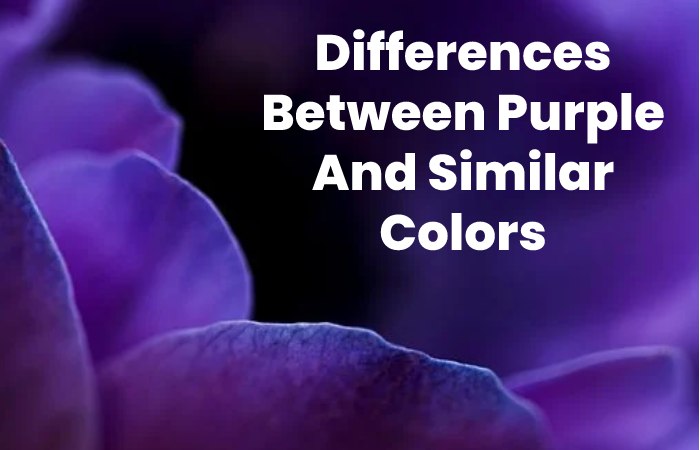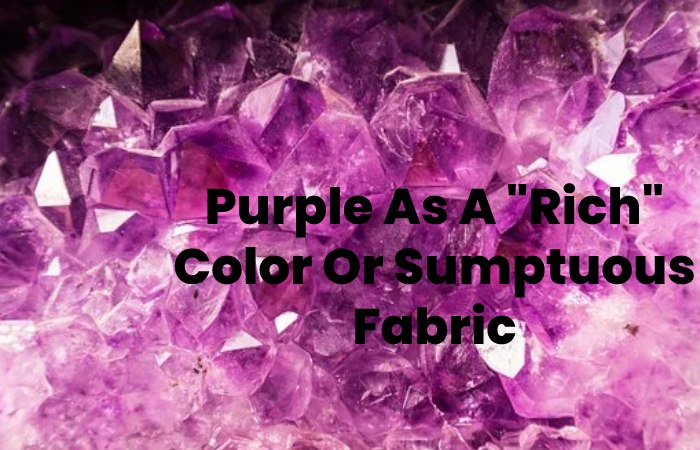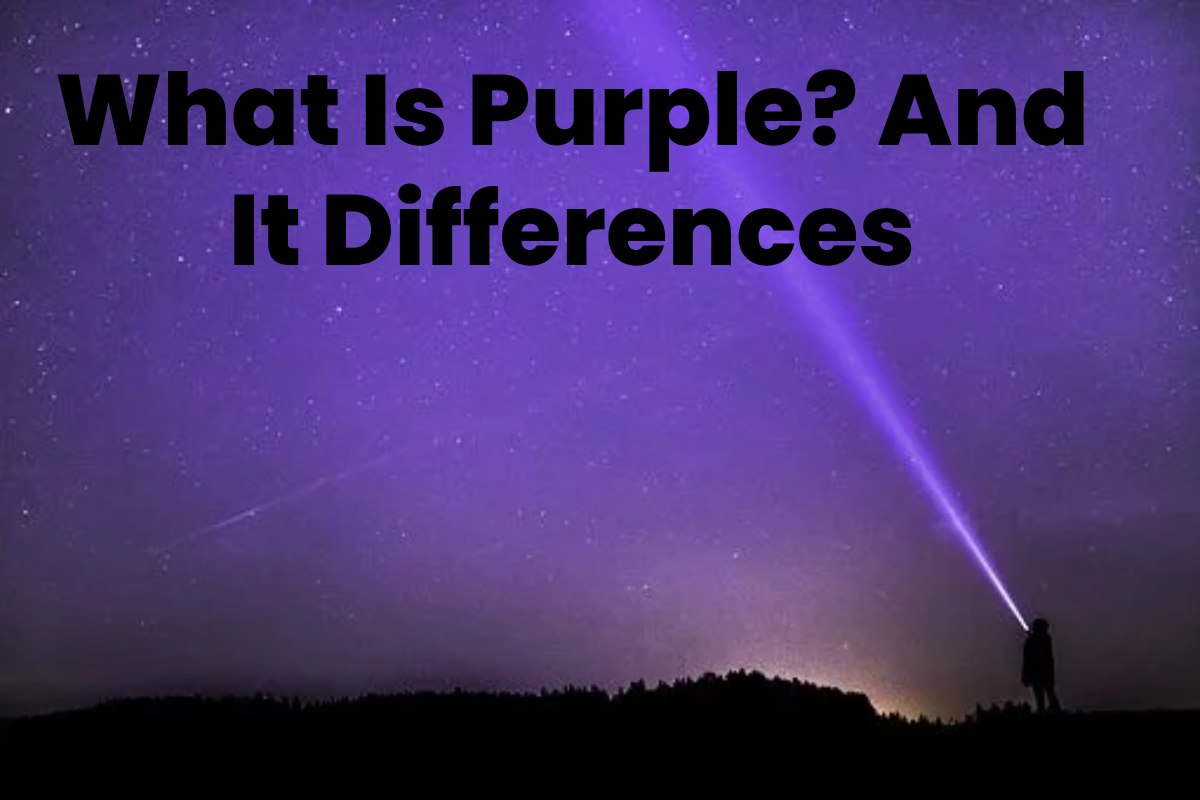Purple is the color or colorations found when red and blue are mixed, or more specifically, it is a deep magenta color between violet and crimson. The term comes to form the marine snails, also called purple snails. Therefore the color produced by the oxidation of the ink of these snails remained similarly called [a highly appreciated ink since ancient times] and dyed fabrics with her.
It is not a standardized color. That is, its hue can be variable.
Names such as purple, violet, lilac, mauve, magenta, or Cardano remain popularly used as synonyms. However, these denominations have different etymology, and although they are also colorations located between red and blue, they have generally developed their specific meaning.
Table of Contents
Differences Between Purple And Similar Colors
Samples of the standard purple and purple colors appearing on a twenty-four-color color wheel are given below for easy comparison. The terminology used in this article corresponds to these colors.
Note that blue-purple is equivalent to violet, and red-purple to magenta.
Between Purple And Violet
As has been said, in a color chart of at least twenty-four shades, purple, broadly speaking, ranges from purplish-red to bluish-purple; violet is next, in the purplish-blue range.
Unlike purple, violet is a spectral color: light with a dominant wavelength between 420 and 380 nm is violet.
An attractive psychophysical quality that differentiates purple from violet is that the latter’s appearance varies with light intensity or luminance. Violet seems to acquire a bluish hue as the light intensity increases due to the so-called Bezold–Brücke phenomenon, where wavelengths below 500 nm turn blue while those above turn yellow. Being a mixture of wavelengths, Purple does not suffer from this phenomenon.
Between Purple And Purple
Being a bluish-[purple], [purple] is technically purple. The difference between [purple] and purple is semantic since the color adjective “[purple]” originates from the description of the pigmentation of blackberries, fruits of the tree called moral.
“[Purple]” dyes and textiles
The word “[purple]” refers to the coloration of certain dyes to dye fabrics, the color they produce, and the fabrics dyed with them. It is not the name of a particular color. These dyes remained made from the secretions of various species of sea snails and, in ancient times, were produced in different regions of the globe. However, Western language and usage remained mainly influenced by the Mediterranean region’s old [purple] dyeing industry.
As dyes were challenging to obtain, [purple]-dyed fabrics were costly, and their use remained restricted to those who could afford them. Eventually, [purple]-dyed garments acquired a symbolic value, denoting nobility: in the days of imperial Rome, for example, only the emperor was allowed to wear them.
Vitruvius, in the 1st century BC. C reports that the coloration of the [purple] dye varied between bluish and reddish and attributes this variation to the place of collection of the mollusks with which it remained made. However, today, it is considered that the variation could be due to the use of different species of snails (each of which produces a somewhat different color), the mixing of the dyes to obtain color variants, or other peculiarities of the dyeing procedure.
Purple As A “Rich” Color Or Sumptuous Fabric
On the other hand, according to the Old Anglo- Saxon art historian Charles Reginald Dodwell, the Latin term [purple] referred to a variety of thick, showy, and expensive silk cloth of more than one color. Dodwell considered that this fabric could have been similar to taffeta, with the warp threads of one color and the weft threads of another, so that with movement, when the light fell on its folds, it changed color. This type of cloth, despite its name, could be any color: the textual and historical sources studied by Dodwell mentioned [purple] fabrics that were predominantly red, white, black, and green.
Purple In The Traditional Coloration Pattern
In the traditional models in Spanish, the intermediate secondary color between blue and red is called [purple], violet, or [purple].
Ever since the trichromatic model of coloration stood discovered in the 17th century, [purple] has been considered the secondary color that can remain produced by mixing the primary colors red and blue. Such is the case of D’Aguilon ‘s coloring system, who in 1613 wrote the term “purpureus” in Latin. A French painting treatise from 1708 is more specific, placing [purple] ( purple ) between violet and crimson red. In Moses Harris’s English color system (1776), the color wheel remains listed with purple between [purple]-blue and [purple]-red; 16and in Wilhelm von Bezold’s (1874) German color theory, [purple] ( purple ) remains listed between red and violet.
1. Linguistic Peculiarities
The definition of the color [purple] can vary by language. Therefore, translators of ancient texts must exercise caution and those who interpret and translate living languages.
2. Purple in German
In the German language, the color [purple] ( purpura ) remains popularly defined as an intense red, somewhat purplish, comparable to the carmine of pictorial use. But it can range from carmine to violet.
3. Purple in French
The [Purple] ( purple ) is a deep dark red or purplish-red color in the French language.
4. Purple in Italian
[Purple] ( porpora ) is a semi-dark and intense red in Italian. It can range from carmine to purplish red.
5. Purple in English
In the English language, the name purple covers many colors ranging from reddish [purple] to violet and includes the latter.
6. Purple in Portuguese
In the Portuguese language, roxo, cognate with the Spanish “red,” means “[purple].” Therefore, it is worth it in Portuguese.
7. [Purple] in Spanish
According to the Rae dictionary, in its meaning 9, Said of a color: Dark red that tends to violet. But in its first meaning, it does not refer to color but the dye: 1. f. Marine gastropod mollusk, whose shell remains twisted and rough. Has a wide mouth or opening or a notch at the base and secretes a minimal amount of yellowish ink. Which turns green when in contact with the air. Which then changes into more or less dark red, purplish-red, or violet. 2. f. Costly dye that the ancients prepared with the ink of various species of [purple] or other similar mollusks. The word [purple] refers to the dye itself and not to a particular color since the dye can give a range of them between violet and scarlet.
8. Purple in Japanese
In the Japanese language, [purple] remains called Murasaki, and in its standard form, it is a reddish-[purple]. However, towards the finish of the 19th century, the name paapuru stayed aimed at [purple]. Derived from the English [purple], remained introduced in Japan. Below is the standard Japanese [purple].
Conclusion
Purple is a color that sends sensitivity, delicacy, style, luxury, or spirituality. It is the result of the mixture of red and blue. The [purple] color is associated with elegance, sensitivity, or even magic.
Also read: How To Remove Magnetic Eyeliner

